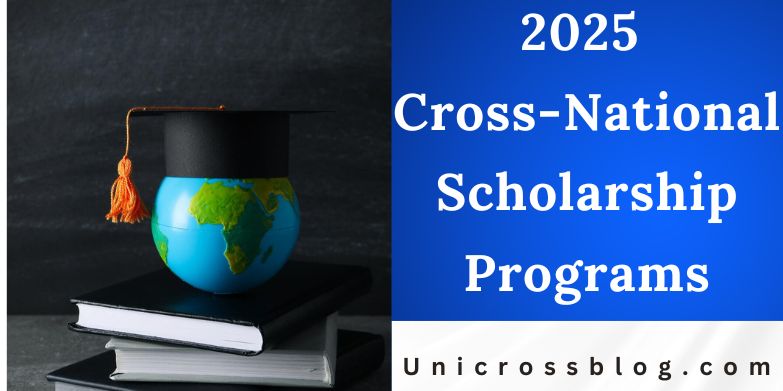In an increasingly interconnected world, cross-national scholarship programs serve as vital bridges, enabling students and professionals from diverse backgrounds to pursue higher education and research abroad. These initiatives not only alleviate financial barriers but also foster global understanding, cultural exchange, and collaborative innovation. As of 2025, with geopolitical shifts and economic challenges influencing access to education, such programs have become more essential than ever. They empower emerging leaders to address pressing global issues like climate change, public health, and sustainable development through international perspectives.
This guide explores key cross-national scholarship opportunities available for the 2025-2026 academic year. Drawing from established programs funded by governments, universities, and international organizations, we highlight eligibility, benefits, and application essentials. Whether you’re a graduate student eyeing a master’s in Europe or an undergraduate seeking study abroad funding, these scholarships offer pathways to transformative experiences. By participating, recipients join alumni networks that span continents, amplifying their impact long after graduation. With deadlines approaching, now is the time to prepare compelling applications that showcase your potential as a global changemaker.

Cross-National Scholarship Programs
1. Fulbright Foreign Student Program
The Fulbright Foreign Student Program, sponsored by the U.S. Department of State, is one of the most prestigious cross-national initiatives. Established in 1946, it promotes mutual understanding between the United States and other nations by funding graduate study, research, and teaching assistantships for international students. For 2025-2026, the program continues to support over 4,000 scholars annually from more than 160 countries, emphasizing fields like public policy, STEM, arts, and humanities.
Eligibility typically requires a bachelor’s degree, strong academic records, and at least three years of professional experience, though requirements vary by country. Applicants must demonstrate leadership potential and a commitment to returning home to contribute to their communities. The program excludes medicine but welcomes interdisciplinary proposals.
Benefits include full tuition coverage, a living stipend, round-trip airfare, health insurance, and professional development opportunities. Grants last 9-12 months, with extensions possible for research. Selection involves national screening committees, followed by review by U.S. university hosts and the Fulbright Foreign Scholarship Board.
Applications open in spring 2025 through U.S. embassies or Fulbright Commissions in applicants’ home countries, with deadlines generally between May and October 2025. Successful candidates are notified by mid-2026, aligning with fall enrollment.
2. Chevening Scholarships
Funded by the UK Foreign, Commonwealth & Development Office (FCDO), Chevening Scholarships target future leaders from over 160 countries for one-year master’s degrees at UK universities. Launched in 1983, the program has awarded nearly 60,000 scholarships, building a global network of influencers in governance, business, media, and beyond. For 2025-2026, applications opened on August 5, 2025, emphasizing applicants who can drive positive change in their home countries.
To qualify, candidates need a bachelor’s degree (or equivalent), at least two years of work experience, and proficiency in English. Leadership and networking skills are crucial, as evidenced by essays on career goals and UK course choices. Applicants select up to three eligible master’s programs, focusing on full-time, taught courses.
The fully funded award covers tuition fees, a monthly stipend, travel costs, arrival allowance, and thesis grant, totaling over £18,000 per scholar. Additional perks include exclusive events, internships, and access to the Chevening alumni community for lifelong support.
The competitive process includes online applications closing October 7, 2025, at 12:00 UTC, followed by interviews in early 2026. Results are announced by June 2026, with studies commencing September 2026.
3. DAAD Scholarships
The German Academic Exchange Service (DAAD) offers a vast array of scholarships promoting international academic mobility, with over 145,000 fellows supported in 2018 alone. For 2025-2026, key programs like “Study Scholarships for STEM Disciplines” and “Development-Related Postgraduate Courses (EPOS)” target students from developing and emerging countries, funding master’s and PhD studies at German universities. DAAD emphasizes sustainable development, research excellence, and intercultural dialogue.
Eligibility varies: STEM scholarships require a first-degree qualification and enrollment in eligible German programs, while EPOS focuses on professionals with at least two years of experience in development fields. Language proficiency (German or English) and a motivation letter highlighting societal impact are essential.
Funding includes monthly stipends (€934 for graduates, €1,300 for PhDs), travel allowances, health insurance, and study/preparation grants. Some programs cover tuition and rent subsidies, with durations from 10-24 months.
Applications open in August-September 2025 via the DAAD portal, with deadlines by October 31, 2025, for most programs. University nominations and peer reviews follow, with decisions by March-May 2026.
4. Erasmus Mundus Joint Masters
Erasmus Mundus Joint Masters (EMJM), funded by the European Union, deliver integrated master’s programs across at least three European countries, involving consortia of universities. For 2025 intakes, 87 new projects were selected, covering analytical chemistry, renewable energy, international law, and more. These programs attract over 20,000 students yearly, enhancing Europe’s higher education appeal.
Applicants need a bachelor’s degree and relevant experience; scholarships prioritize non-EU students but are open globally. Programs like EMGS (Global Studies) or GLOCAL emphasize interdisciplinary tracks in policy, peace, and sustainability.
Scholarships cover participation costs (€9,000/year), travel (€1,000-€3,000), and a monthly allowance (€1,000), plus health insurance, for two-year degrees. Self-funding options exist for others.
Applications typically open October 2024-January 2025 per program, via university portals. Deadlines vary (e.g., January 12, 2025, for GLOCAL; January 24, 2025, for EDUMaH). Selections occur by April-May 2025.
5. Other Notable Programs
Beyond the flagships, several programs offer cross-national opportunities:
- Benjamin A. Gilman International Scholarship: For U.S. undergraduates with financial need studying abroad; awards up to $5,000 for semesters or $2,500 for summers. Deadlines: October 1, 2025 (fall), March 7, 2026 (spring).
- Boren Awards for International Study: Funds U.S. students in critical languages/regions; scholarships up to $25,000, fellowships to $30,000. Campus deadline: January 2025.
- Hubert H. Humphrey Fellowship: Non-degree program for mid-career professionals from designated countries; covers 10 months in the U.S. Deadlines: vary by country, summer 2025.
- MPOWER Global Citizen Scholarship: For international students in the U.S./Canada; $2,000-$8,000 awards monthly. Open year-round.
These complement major programs, often stackable for broader support.
Application Tips
Securing a cross-national scholarship demands strategic preparation. Start early: Research programs aligning with your goals six months in advance. Tailor applications—highlight leadership, cultural adaptability, and post-study impact. Secure strong recommendations from mentors familiar with international contexts. Proofread essays for clarity; use tools like Grammarly. Prepare for interviews by practicing responses on motivation and challenges. Track deadlines across time zones and submit all documents (transcripts, CVs, proposals) digitally. If rejected, seek feedback and reapply—persistence pays off.
READ ALSO: Fully Funded Scholarship Opportunities in Oceania 2025
FAQs
Who is eligible for these scholarships?
Most target international students with strong academics and leadership; specifics vary (e.g., Fulbright requires no prior U.S. degree, Chevening needs work experience). Check country-specific criteria.
Can I apply to multiple programs?
Yes, but disclose overlaps in applications to avoid conflicts. Prioritize based on fit.
What if English isn’t my first language?
TOEFL/IELTS scores are required (e.g., IELTS 6.5+ for Chevening). Some programs like DAAD offer German courses.
Are family dependents covered?
Rarely; Fulbright and Chevening provide limited allowances, but most focus on the scholar.
What happens after the scholarship ends?
Many require a return home (e.g., two-year rule for Fulbright J-1 visa), but alumni networks offer career support globally.







